
Most people are aware of Fairtrade and its eye-catching symbol on the packaging of many food and drink items. We’ve been educated by this symbol and its meaning to be conscious of its presence when purchasing these items. However, it’s not only when looking for confectionery and coffee that this Fairtrade sign is significant, but also when we’re browsing clothing brands.
What is Fair Trade Certified?
When we refer to fair trade, we specifically mean clothing and textiles that are officially Fairtrade certified and made using Fairtrade materials. The foundation partners with farmers and workers to make certain that businesses source their products for a fair price, and treat workers fairly. Businesses agree to pay an additional premium which allows
This can be life-changing for farmers and workers who are able to earn a wage they can support themselves and their families on. Fair trade fashion is hopefully the future of the clothing industry, but that will only happen if people start to make conscious decisions when searching for clothes to actively shop fair trade.
Importance of Fair Trade in the Clothing Industry
If a piece of clothing is Fair Trade then you can be 100% certain that it is sourced ethically, and the farmers who have produced the materials have been paid fairly for their resources. It’s not only this, they also aim to tackle important issues such as child labor rights and safety, gender equality, climate change, poverty, and workers’ rights.
Embracing Sustainable Practices
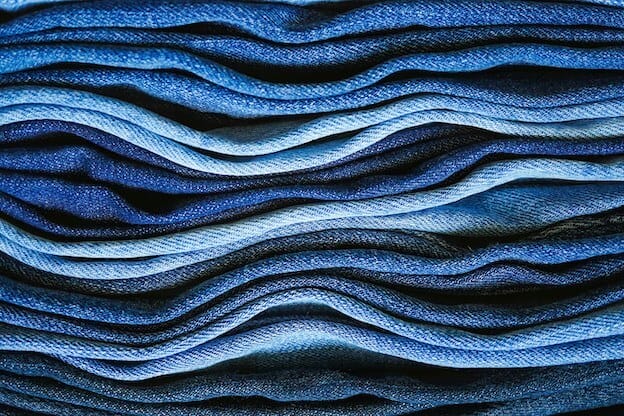
Fair Trade isn’t only about ethical sourcing of products; it’s also about making businesses more environmentally sustainable. They say that by 2050, climate change could make cotton production impossible in some places.
To tackle this, Fair Trade promotes organic farming and bans the use of dangerous pesticides. Farmers and producers must manage pests, reduce waste, and work to reduce greenhouse gas emissions. At every step, they support the farmers in doing so.
Benefits of Fair Trade Clothing

The benefits of Fair Trade clothing are extensive and significant. It impacts the entire supply chain, from the farmers to factory workers.
It ensures that there are safety measures put in place for employees to protect their physical and emotional wellbeing. Factory employees can vote on how their Fairtrade premium is spent, giving them empowerment and a sense of autonomy as well as economical benefits.
Transparency and Accountability
For a Fair Trade-certified business, this is more than just a label on a shirt; it’s a partnership that holds them to economic, social, and environmental standards and ensures that these standards don’t drop later on in the supply chain. This means that the brands are made accountable for their actions and forced to make transparent their processes, where they source their fabrics, and who is making their clothes.
Social Impact
Over 100 million rural households make a living from cotton production, and the majority of these households are in developing countries where there are few other sources of employment.
There have been many instances of child labour in the cotton industry, and this is a problem that’s been historically hard to tackle. Fair Trade ensures there is no child labour and no sweatshops, making work safer at every point of the supply chain.
Fairtrade helps to support these farmers, with stable, increased prices that allow them to invest not only in their business, with training and equipment, but healthcare and education programs.
Environmental Sustainability
According to Fairtrade’s website,
“Fairtrade supports farmers in managing the environmental and health risks from cotton production and in building stronger organisations with increased bargaining power and a more active role in global supply chains. Fairtrade works with 19 producer organisations growing Fairtrade cotton in seven countries.”
This is vital as climate change and biodiversity losses affect these communities disproportionately, with the effects being felt more in the countries where cotton is produced, despite the fact that they contributed the least to these issues.
What Exactly is the Fairtrade Premium?

Fair Trade makes a real impact on farmers and workers’ lives through the Fairtrade Premium. This is a premium which businesses pay when they go into partnership with Fair Trade, that goes directly to the farms participating in the system.
They can then use the money on whatever they need most through an elected committee of Fair Trade workers who collaboratively decide how the premium should be used. About 18% were spent on community services, while 47% were on agricultural equipment. By allowing farmers to choose where their money goes, it can make the biggest impact and most positive impact.
Top 10 Sustainable Fashion Brands Supporting Fair Trade
1. Outerknown
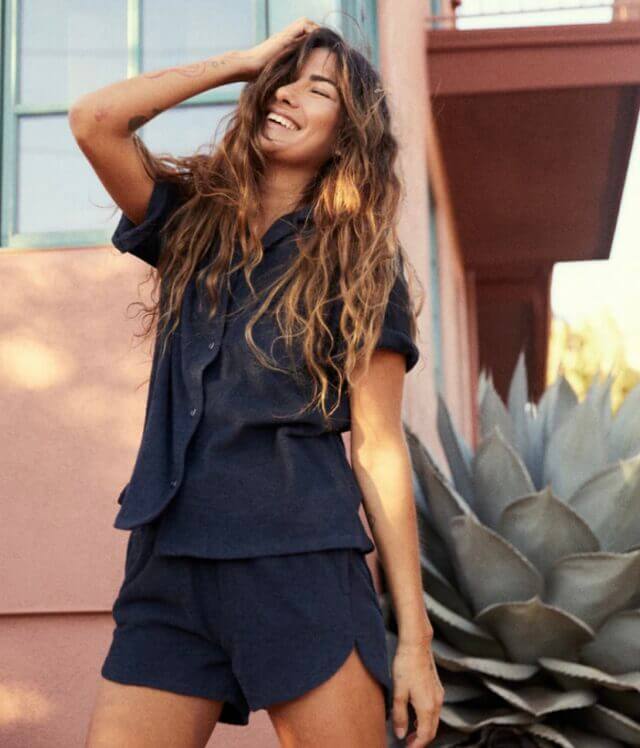
Outerknown is a slow fashion brand that supports Fair Trade certified factories in sourcing their trunks and women’s denim. While the company isn’t 100% Fair Trade, they have a fair compensation and living wage program which is improving working wages for their clothing makers. You can learn more about Outerknown’s commitment to fair compensation for the workers across their supply chain here. The company’s transparency about what they’re currently doing and how they could do better is commendable and we’d love to see more companies following their lead.
Here are some of our favorite pieces.
Eco-Stylist Rating: Gold
2. Pact
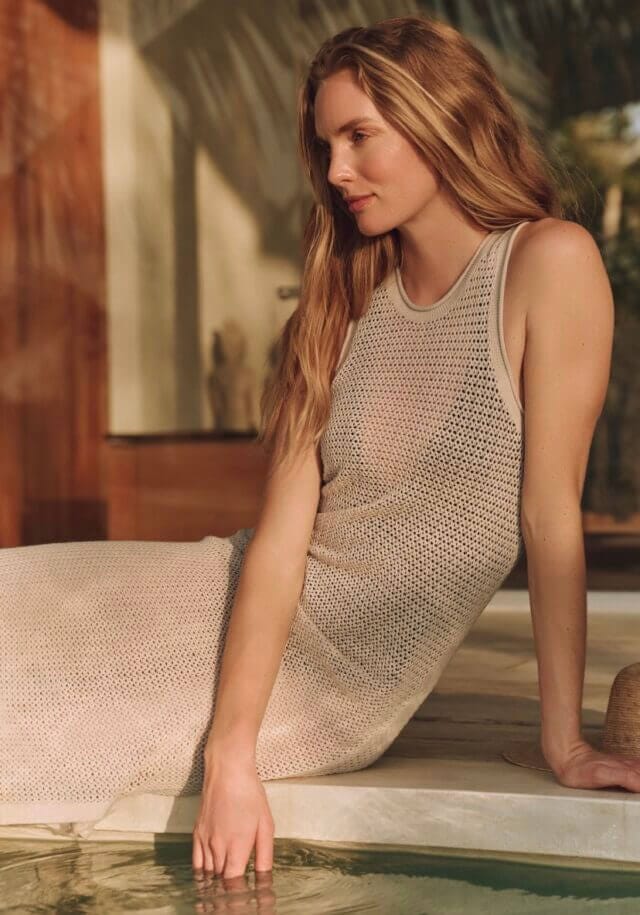
Pact is a brand that wants to empower its clothing makers, making sure their working conditions are safe and clean, and their pay is sufficient to be able to support themselves and their families.
All their cut and sew factories are Fair Trade Certified, and also partner with child labour and sweatshop free factories.
Here are some of our favorite pieces.
Eco-Stylist Rating: Silver
3. KNOWN SUPPLY
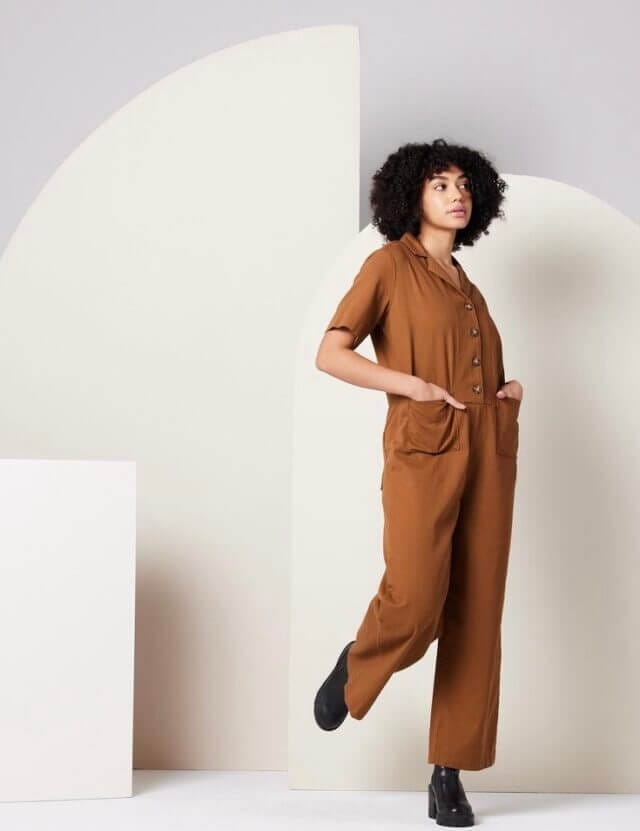
Known Supply partners with Fair Trade Certified producers to ensure that their clothing-making process is as ethical as possible. However, they don’t stop there – they also get their clothing makers to sign the clothes they produce to make people more aware of who makes their products and create direct relationships with their clothing makers. In their words, this is all in an effort to ‘humanise the apparel industry.’
Learn more about how Known Supply can make Fair Trade merch for your club, organization, or business.
Eco-Stylist Rating: Certified
4. prAna

prAna were trailblazers when they first partnered with Fair Trade in 2010, being one of the first clothing companies to do so. However, they haven’t stopped there! Their Fairtrade Premium now helps over 26,000 workers globally, and by 2028 they aim for 100% of their products to be made in Fair Trade certified factories. This is amazing, and we wish them the best of luck to make this happen!
Check out our review of the prAna stretch zion pants.
Eco-Stylist Rating: Certified
5. The Good Tee
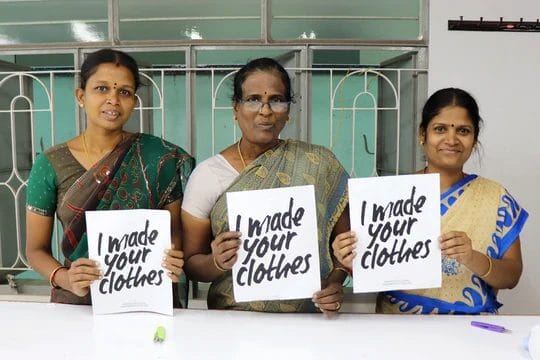
The Good Tee claims that ‘Sustainability and social responsibility are at the core of every decision we make.’ This rings true when you take a look at their certifications and partnerships. As well as being Fair Trade Certified, they are also B-Corp certified, meaning you can trust that their commitment to fair and safe working conditions, as well as sustainability, is real.
Eco-Stylist Rating: Gold
6. Classic T-Shirt Company
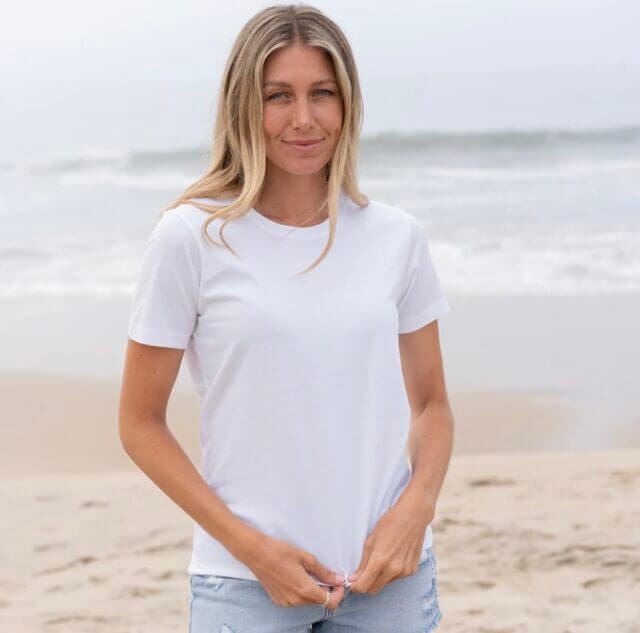
One hundred percent of the Classic T-shirt Company’s t-shirts are Fair Trade! There isn’t much more that needs to be said, but if you want to know more then head to their article ‘Why Should I Care About Fair Trade T-Shirts In 2024?’ which summarizes their commitment to Fair Trade perfectly.
Eco-Stylist Rating: Certified
7. Etiko
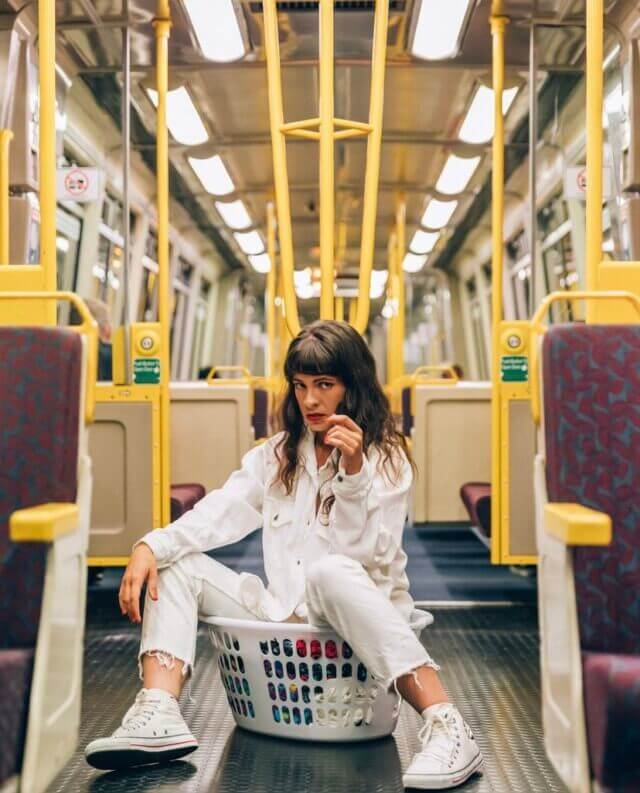
With the slogan ‘wear no evil,’ Etiko is keen to ensure its products are made with the least negative impact possible on the environment and garment workers. They were awarded the Australian Human Rights Award in 2016, and since then have been making even more changes to address exploitation and injustice in the fashion industry.
Eco-Stylist Rating: Gold
8. Ten Thousand Villages
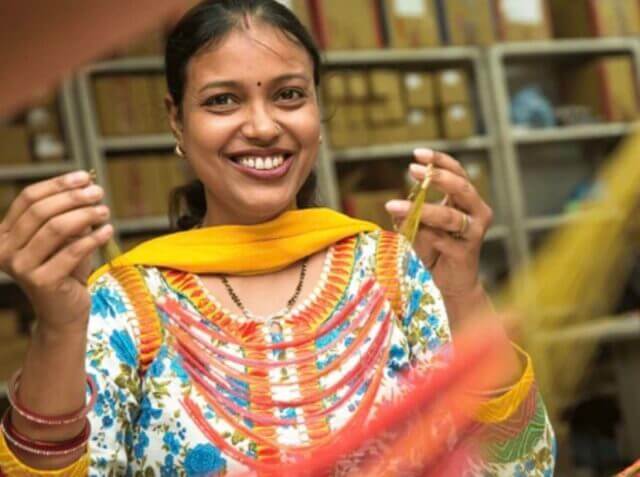
Shopping Fair Trade doesn’t just stop at clothing, it’s also about accessories, gifts, and home essentials. Ten Thousand Villages are a ‘movement that addresses economic injustice.’ They use the hashtag #livelifefair and are complete Fair Trade Certified.
Eco-Stylist Rating: Certified
9. Patagonia

Patagonia has been partnered with Fair Trade USA since 2014, benefiting more than 75,000 workers around the globe in this time. They also encourage others to join the Fair Trade movement, and understand that more needs to be done for the outdoor apparel industry to make change and find a way for all workers to get a living wage.
Check out some of our favorite pieces.
Eco-Stylist Rating: Gold
10. Subset
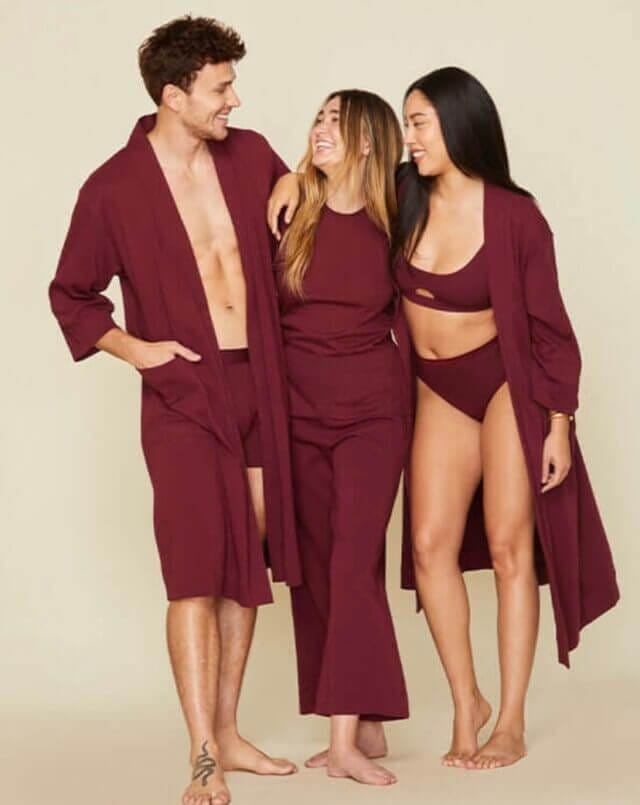
A relatively new brand, established in 2018 and updated in 2023, Subset is focused on safe, natural, non-toxic materials. Every step of their supply chain is organic, and the products are knitted and dyed in an organic, fair-trade factory.
Eco-Stylist Rating: Gold
Alternatives to Fair Trade Certified

Alternative 1: Eco-Stylist Certification
We work to educate people on how to shop in a more eco-conscious way. Whether that’s through our brands to avoid, sustainable fashion guides, or ethical brands we want to make sustainable fashion as accessible as possible so that you can feel assured that you’re spending your money in the right places, on clothing that’s made in an eco-friendly and ethical way.
All the brands featured on our website are rated based on three key pillars that we feel are important for consumers to be aware of. These pillars are transparency, fair labor, and sustainably made.
By highlighting the importance of these three pillars and educating consumers about sustainability and social issues in the fashion industry, we hope to effect more change in the future because while our brands are the best at what they do, they could still do better.
Here are some key statistics to show just how seriously we take our assessment of brands when rating them. Only the best brands make it onto our brand guide.
- 93% of the fashion brands in our guide use mostly sustainable materials like hemp, linen, TENCEL, and organic cotton across their entire brand.
- 78% of these brands are making progress on providing living wages, and 60% pay the majority of their clothing makers a living wage.
- 83% of our brands share detailed information about where and how their clothes are made.
Therefore, although not all our fashion brands are certified Fairtrade, they are still working in other ways to ensure that they create a more sustainable and ethical approach that you can trust.
Alternative 2: Living Wages
There is an average 45% gap between the minimum wages of garment and footwear workers and a living wage. This shocking statistic shows how hard it is for workers to survive and care for loved ones on their wages when companies don’t commit to living wages.
Many brands are committed to providing living wages outside of being Fair Trade Certified. By shopping with those who have made proven commitments to paying their clothing makers a living wage, you can feel certain that you’re shopping ethically. It’s always best to research before you believe a company to ensure you’re not taken in by greenwashing and exaggerated claims – take a look at their impact reports, whether they’re using the Anker Methodology, or partnering with people like the Fair Labor Association.
As well as choosing to buy from businesses that provide living wages for their garment makers, there are also lots of other ways you can make changes to ensure living wages become the norm. A good example of this was the Good Clothes, Fair Pay campaign that worked to create legislation for living wages in the EU, for clothing makers across the world, but there are many more that you can become a part of.
Looking for fashion brands that pay living wages? You can filter by brands that pay living wages in our brand guide!
How to Identify Fair Trade Clothing

The easiest way to identify whether clothing is Fair Trade is to look for the symbol on the clothes or packaging. This means that the raw cotton the clothing company has used is sourced from a Fair Trade producer.
Many clothing brands who are partners with Fair Trade Certified will have a dedicated Fair Trade section of their website, so that even if their collection is not 100% Fair Trade, you can be certain the products you choose are.
The Future of Fair Trade Clothing
The more pressure we, as the consumer, puts on the clothing industry to be held accountable for where they source their cotton, and what factories they partner with, the more widespread Fair Trade clothing will become.
Fairtrade advocates for full supply chain transparency, and the more people that demand the same from their clothing companies, the quicker we can make this change happen. There have been proposed EU legislation to ensure living wages for clothing makers and all parts of the fashion supply chain, and it would be great to see this implemented.
Where to Find More Sustainable Brands
If you want to shop sustainably and don’t know where to look, then search no further! Our brand guide has everything you need. We update it regularly to ensure that the companies we’re promoting are truly the best ethical and sustainable fashion brands. We believe that slow fashion should be accessible to all and hope that our brand guide can help make this hope a reality.
Want More Ethical Fashion Content?
You can also subscribe to our mailing list to make sure that you’re up to date with all the latest sustainable fashion news and knowledge. Enter your email to sign up.

Ellie recently graduated from University of Sheffield after studying English Literature. She loves all things related to books and writing, as well as being interested in fashion and art.









